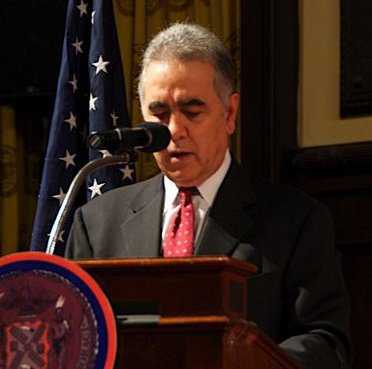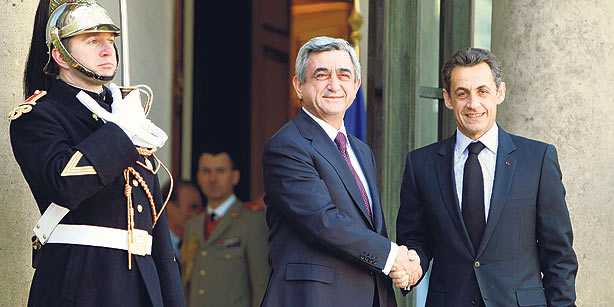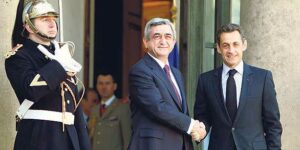
Category: Authors
-

Armenian-Americans Preparing Special Welcome for Pres. Aliyev in New York
How could the warmongering President of Azerbaijan be permitted to chair the UN Security Council, the august body that is supposed to promote peace and security in the world? Unfortunately, such an outrage is possible simply because it is Azerbaijan’s turn to take over the rotating chairmanship of the Security Council in the month of May.Given Ilham Aliyev’s persistent anti-Armenian rhetoric, no one should be surprised when he transforms the UN podium into a battlefield. Fortunately, his military has neither the training nor the motivation to use its highly sophisticated weapons, including those purchased recently from Israel for $1.6 billion. Given Azerbaijan’s inability to unleash an actual war against Artsakh (Karabagh), and fearing that such a confrontation may end with the loss of more territory and devastate his country’s petroleum industry and oil pipelines, Aliyev is trying to distract his destitute people’s attention by issuing threats and launching a war of words against Armenians!The problem is that Azeris at home won’t be the only ones listening to Aliyev’s hostile statements. The countries bordering Azerbaijan — Iran, Turkey and Russia, will be taking special note of his saber-rattling at the UN. These neighboring states are alarmed by Azerbaijan acting as a surrogate for Israel in their backyard. Should Israel attack Iran by using Azerbaijan’s air bases, Iran may retaliate by annexing Azerbaijan, since there are many more Azeris in Northern Iran than in all of Azerbaijan.Aliyev’s UN diatribe will probably include some of the same hostile words that he has used recently in Baku. He called Armenians “fascists” and described them as Azerbaijan’s chief adversary. He then blamed “the Armenian lobby” for being his “number one enemy.” Using language borrowed from anti-Semites, and substituting “Armenians” for “Jews,” Aliyev made the following racist accusation: “The scope of their influence is quite broad. They [Armenians] are represented in the leading print media outlets of various countries. Sometimes they go under different names and hide their ethnic origin.” Aliyev’s on-going hateful speeches provide the best evidence as to why Artsakh Armenians can never again live under his despotic regime.The Azeri President also objected to Armenians calling Azerbaijan “backward and undemocratic,” which accurately describe his country’s dismal human rights record. Amnesty International, Human Rights Watch, the European Parliament, the State Department, and the Western media have repeatedly criticized Azerbaijan for violating the rights of countless journalists, bloggers, dissidents, opposition members, and common citizens!Eduard Sharmazanov, Deputy Speaker of Armenia’s Parliament, gave an fitting response to Aliyev last week, when he bragged that “the day will come when the Azerbaijani flag will fly in Khankendi [Stepanakert] and Shusha [Shushi].” Sharmazanov quipped that the Azeri flag can fly in Azerbaijan’s embassy in Artsakh, only after Baku recognizes the independence of the Republic of Artsakh and establishes diplomatic relations with it.To counter Aliyev’s war of words, Armenian-Americans, along with human rights activists and Azeri dissidents, will certainly raise their voices in protest in front of the UN headquarters in early May, as Azerbaijan’s President begins spewing his usual anti-Armenian venom.Unfortunately, Aliyev has no plans to come to the West Coast where the large Armenian community would have surely welcomed him with massive protests against his Armenophobic speeches and activities. However, the California Armenian community could take advantage of Aliyev’s US visit by urging the State legislature to adopt Assembly Concurrent Resolution 96 that commemorates the massacres of Armenians in the Azeri cities of Sumgait, Kirovabad, and Baku.Violating US laws and established diplomatic protocol, the Consulate General of Azerbaijan in Los Angeles sent a lengthy letter to all members of the California State Assembly urging them not to support this resolution. The letter, signed by Ramil Gurbanov, Acting Consul General of Azerbaijan, is obviously drafted by one of its lobbying firms. This piece of propaganda contains many ridiculous statements, but that is not the concern of the “hired guns,” which will do anything to keep their Azeri paymasters happy, as long as they are compensated handsomely for their dirty work.West Coast Armenian-Americans should contact their State legislators, in particular, the co-authors of Resolution 96 — Assemblymen Felipe Fuentes, Katcho Achadjian, and Mike Gatto, and urge them to bring this bill to a vote while Pres. Aliyev is still on US soil. Meanwhile, East Coast Armenian-Americans should turn out in large numbers in front of the UN headquarters in early May to protest Pres. Aliyev’s racist remarks as “Chairman” of the UN Security Council!Furthermore, the Armenian community should complain to Federal and State authorities about the Azerbaijani Consulate’s illegal interference in internal US affairs and demand expulsion of Ramil Gurbanov from the United States as “persona non grata.” -

FOLLOW FOX TV ON APRIL 24TH – COMMENT ON ARMENIAN ISSUE
Dr. Israel Charny and Harut Sassounian to appear on Fox TV on April 24.

Dr. Israel Charny, invited by the United Armenian Council to speak at this year’s commemoration of the Armenian Genocide in Montebello, and Harut Sassounian, a member of the UAC, will appear for around 5 minutes on Fox TV’s evening news hour on Tuesday, April 24, to speak about the Armenian Genocide.
The interview will be aired as follows (West Coast time):
1) KTTV Channel 11 (10-11 p.m., on April 24). It will be repeated later that night, 1-2 a.m.
2) The interview will be repeated again on Channel 13 (11-11:30 p.m., on April 24).
-

Ottoman Fruit Syrups (Şerbet)
Şerbet made from fresh fruit were an indispensable beverage in Ottoman palace cuisine as well as among the common people and were traditionally served to guests. Despite being on the brink of oblivion today, they still find a place on the table wherever authentic Ottoman cuisine is served. In villages in eastern Turkey, it is still true today that, after a dowry is agreed on, the groom’s family comes to the bride’s house and out comes a long-spouted brass or copper ewer, called an ibrik, filled with gül ş
 erbeti, or rose sherbet. The woman who has “drunk şerbet” has accepted the groom’s suit. Due to the Islamic ban on alcohol, for example, beverages in the Islamic world tended to consist of fruit juices and syrups. Fruit juice is of course consumed all over the world, but the fresh fruit syrups known as ‘şerbet’ appeared and were consumed in quantity among the Muslim communities of the Eastern Mediterranean, the Middle East and Central Asia. English travelers and envoys made the acquaintance of şerbet in the Ottoman period and borrowed the word directly into their own languages, thereby universalizing it. The renowned food historian Alan Davidson reports that ‘şerbet’ entered the Italian language as ‘sorbetto’ during the period of Ottoman-Byzantine-Venetian relations.
erbeti, or rose sherbet. The woman who has “drunk şerbet” has accepted the groom’s suit. Due to the Islamic ban on alcohol, for example, beverages in the Islamic world tended to consist of fruit juices and syrups. Fruit juice is of course consumed all over the world, but the fresh fruit syrups known as ‘şerbet’ appeared and were consumed in quantity among the Muslim communities of the Eastern Mediterranean, the Middle East and Central Asia. English travelers and envoys made the acquaintance of şerbet in the Ottoman period and borrowed the word directly into their own languages, thereby universalizing it. The renowned food historian Alan Davidson reports that ‘şerbet’ entered the Italian language as ‘sorbetto’ during the period of Ottoman-Byzantine-Venetian relations. -

IT WILL NOT HAPPEN TO ME! GUESSWHAT? IT WILL!!!
IT WILL NOT HAPPEN TO ME! GUESS WHAT? IT WILL!!
*****
PART TWO:
OUR FUTURE
Chapter Seven
Arthur H. Vandenberg Senator – Republican, Michigan
Because I was born and raised in the United States this book is written from the perspective of this country. However, the problems today do not only apply to the United States, but the whole planet earth. Therefore my solutions apply to every nation.
Thomas Edison invented electricity and Alexander Graham Bell invented the telephone towards the end of the 19th century. Those two inventions have led us to leap frog over centuries of advancement in just a few decades. Our health and standard of living has blossomed as each decade ends and we begin a new one. We have progressed in every area, but one. Our Politicians! They are still the same as they were in George Washington’s time.
The first and foremost idea to our self-help resurrection is to promote a better standard of choosing our representatives. Without leadership for the “Common Good” we are doomed as a free capitalistic society.
In the US Capital, in the Senate Reception Room, there were busts of the Famous Five. On March 12, 1959 the Senate chose five men whose careers helped shape this nation. They were Henry Clay, Daniel Webster, John C Calhoun, Robert M Lafollette Sr. and Robert A Taft
Then on September 14, 2004 the Senate added two more distinguished names. Senator Robert F Wagner – D NY and Arthur H Vandenberg R- MI were the two senators singled out as superb leaders when our nation needed them most. Both men were 1930’s and 1940’ vintage.
Senator Wagner’s achievements are mind boggling on the domestic front. Almost every piece of legislation had his fingerprints all over it.
Senator Vandenberg had a more interesting career in my humble opinion. He came to the Senate in 1928 and he was a strict isolationist and conservative. In the beginning he started out voting against some of FDR’s programs. He was becoming a swing vote. He was voting on the issues and not the party line.
When he ran for reelection in 1934 he had the distinction of losing his home district, but winning the state by over 52,000 votes.
He served on the Foreign Relation committees and as time went on he backed FDR on foreign policies and so did his fellow republicans. His great achievement came with what is called “the speech heard around the world” in the US Senate.
Harry Truman had yet to become President. FDR’s death and victory was still months into our future. This led to “the victors belong the spoils” and he sensed mayhem on the foreign fronts.
So on January 10, 1945 he gave the speech in the US Senate that was “heard around the world”. It let the whole world know that as far as foreign policy was concerned the Republican Party, currently the minority party, would back the President of the United States of America. The President, duly elected by the entire nation, was the only individual that could gather and collect the necessary information from any source that he deemed significant in making decisions.
Here is part of his speech:
“I wholeheartedly agree with President Roosevelt when he says: “We must not let such differences divide us and blind us to our more important common and continuing interests in winning the war and building the peace.
On the other hand, I hold the deep belief that honest candor, devoid of prejudice or ire, is our greatest hope and our greatest necessity; above all others, is called at long last to exercise this honest candor not only with its allies but also with its own faithful people.”
That speech, dear reader, let everyone know that when the President of the United States spoke on international affairs he had the backing of the whole nation. No more failed peace treaties of WW I, or international organizations like the League of Nations.
All the momentous decisions that were made after WW II were due in part because the president knew that he had the support of congress and foreign entities knew he had a “big stick” that he could use.
Senator Vandenberg died in office in 1951, but his example lived on for a few more years.
Majority leader of the US Senate, Lyndon Johnson, would do the same in his support for President Eisenhower. He would be known as one of the great majority leaders, but sadly a flop as President.
Our political system is now decaying because we lack the leadership that Senator Vandenberg displayed.
This applies to every nation that holds free elections when the end comes. This will be the true test of free capitalism.
When the governments provide all, the incentive to excel is left in the bedroom. We could slip back into a new computer form of the dark ages or worse yet “1984”.
We must choose carefully who we elect because that process is breaking down with the use of television “sound bites” instead of substance. We are making progress with the “debates”, but the media still carries the sword.
Possible Solutions
At the end of each chapter, I will offer a possible solution to our problems. Upon contemplating my ideas, a bell might go off in your brain with better ideas. One idea can lead to another and the final pieces of the puzzle can make it look like a mature model.
As long as there are free elections it does not matter what country one resides in, because in the long run we will all have to work together just as FDR and Senator Vandenberg expressed.
So lets us begin:
Each community should form an election counsel made up of concerned citizens of every stripe or persuasion.
Their mandate is to interview potential candidates for local offices and determine whether they will represent the entire community fairly if elected. Their own political views should not be known. They should be concerned with whether the person is running because he needs a job, or is trying to make a living off the public. It is not an endorsement of a political party, but of a Candidate, if elected, which will govern for the common good of all. The perfect situation would be when there would be a primary and 3 of the 4 candidates had received the seal of approval.
Ideally this counsel should be able to act favorably of all candidates running for the same office.
What we are looking for are persons that have a strong moral background, who are ethically honest, and who consider it an honor and privilege to serve their community.
Depending upon the size of the community there should be at least 11 persons on the counsel. This should insure that unbiased selections are made.
Then for county and larger areas, the committee should be made up of 3 or more persons from the communities in that area.
Next: Bilingualism and education.
IT WILL NOT HAPPEN TO ME! GUESS WHAT? IT WILL!!
*****




